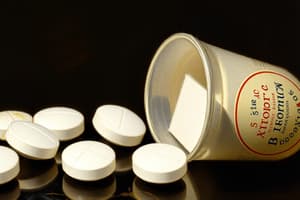Podcast
Questions and Answers
What is the therapeutic class of ketorolac (Toradol)?
What is the therapeutic class of ketorolac (Toradol)?
- Nonsteroidal anti-inflammatory agents (NSAID) (correct)
- Opioid analgesics
- Corticosteroids
- Nonopioid analgesics (correct)
What is the pharmacologic class of ketorolac (Toradol)?
What is the pharmacologic class of ketorolac (Toradol)?
Pyrroziline carboxylic acid
What is the primary indication for ketorolac (Toradol)?
What is the primary indication for ketorolac (Toradol)?
Short-term management of pain (not to exceed 5 days total for all routes combined)
What is the mechanism of action of ketorolac (Toradol)?
What is the mechanism of action of ketorolac (Toradol)?
What are the therapeutic effects of ketorolac (Toradol)?
What are the therapeutic effects of ketorolac (Toradol)?
Which of the following are major side effects of ketorolac (Toradol)? (Select all that apply)
Which of the following are major side effects of ketorolac (Toradol)? (Select all that apply)
Ketorolac (Toradol) should not be used for more than ______ days for all routes combined.
Ketorolac (Toradol) should not be used for more than ______ days for all routes combined.
What is the adult oral dosage parameter for ketorolac (Toradol)?
What is the adult oral dosage parameter for ketorolac (Toradol)?
Flashcards are hidden until you start studying
Study Notes
Ketorolac (Toradol) Overview
- Ketorolac is a nonsteroidal anti-inflammatory drug (NSAID) classified under nonopioid analgesics.
- It belongs to the pyrroziline carboxylic acid pharmacologic class.
Indications and Uses
- Indicated for short-term pain management, with usage not exceeding 5 days for all routes combined.
Mechanism of Action
- Inhibits the synthesis of prostaglandins, leading to analgesic effects primarily mediated peripherally.
- Provides additional antipyretic and anti-inflammatory effects.
Therapeutic Effects
- Results in decreased pain for patients.
Side Effects
- Central Nervous System: Drowsiness, abnormal thinking.
- Cardiovascular: Risks include heart failure, myocardial infarction, stroke, along with edema, pallor, and vasodilation.
- Gastrointestinal: Potential for GI bleeding, hepatitis, abnormal taste, diarrhea, and dry mouth.
- Dermatological: Risk of exfoliative dermatitis, Stevens-Johnson syndrome (SJS), toxic epidermal necrolysis (TEN), along with pruritus, purpura, sweating, and urticaria.
- Miscellaneous: Anaphylaxis can occur as a serious allergic reaction.
Dosage Parameters
- Adult dosage can vary, with specific indications for oral and intravenous (IV) administration provided in clinical settings.
Studying That Suits You
Use AI to generate personalized quizzes and flashcards to suit your learning preferences.




